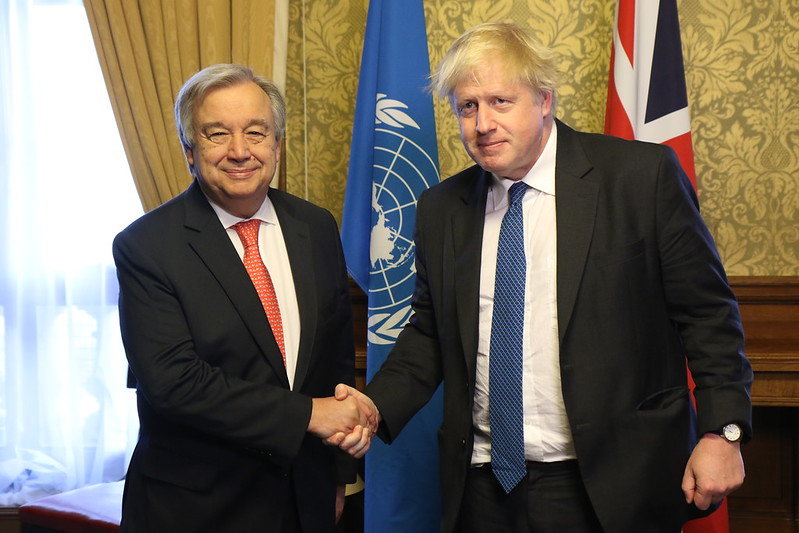This week the international community celebrates the 75th Anniversary of the UN General Assembly (UNGA) – a forum where countries gather together to discuss the biggest global issues, and debate what reforms are needed to tackle them. As the country that hosted the first ever UNGA, back in 1946 in London, the UK has a long and proud history of driving solutions at the global scale.
Today, the UK is going through a period of introspection. With its departure from the EU, it faces a once-in-a-generation opportunity to re-define its relations with the world. Reflecting this, Britain’s foreign ministry recently merged with its international development department to form the new Foreign, Commonwealth and Development Office (FCDO), representing a significant change in the machinery of government driving the UK’s international relations.
These developments are the largest shake-up to British foreign policy in nearly half a century. This opportunity must be seized to drive transformational outcomes for the climate and global economy.
But to do so requires building coalitions of allies and progressive actors – and that requires trust.
Trust in the UK?
The UK has traditionally built trust with global partners through its staunch support of the international rules-based system. However, the UK government’s recent admission that it would be prepared to break international laws in order to complete its withdrawal from the European Union has caused a diplomatic fallout, both with the EU as well as a potential future Democratic White House.
This loss of credibility will have dramatic ramifications for the UK’s climate diplomacy.
The duty of the UK as President of the COP26 UN climate talks requires it to be the defender of the rules that govern global climate change – the Paris Agreement, and the multilateral system at the UN more broadly. Flouting international law undermines those efforts, damaging the UK’s international reputation and opening up vulnerabilities to be exploited by opponents of climate action seeking to sow discord and discredit the UK Presidency.
How can the UK rebuild its trust and authority on the world stage? The intellectual force behind the new post-Brexit FCDO will be the Integrated Review, a process that aims to define the Government’s vision for the UK’s role in the world over the next decade across all aspects of international policy and national security. This process is a rare opportunity to fundamentally re-write British foreign policy. Done right, it can begin the process of diplomatic repair post-Brexit and re-launch Britain as an influential geopolitical player.
But what should this look like? Who are the UK’s future allies and how should they work together to advance climate action?
Build Bridges
The UK’s most powerful tool to drive global cooperation on climate change is to sustain the rules-based order as a credible system for ensuring security and prosperity for major powers.
If major powers like the USA and China perceive the multilateral system as failing to deliver, acting against their interests or excluding them from the decision making process, they will fall back on unilateral and regional solutions which will heighten international tensions and ultimately block any hope of global climate action at the pace and scale science requires.
The UK will have to form stronger ongoing alliances with similar medium-sized countries to build a critical mass of powerful countries capable of supporting the multilateral system. This already reportedly chimes with the UK Foreign Minister Dominic Raab’s vision for Global Britain. If he follows this path, it is critical for him to understand that cooperation on climate change provides a key route to building and sustaining such alliances.
The first task should be to build consensus among Commonwealth partners such as Canada, India and Australia as well as other democratic nations like South Korea and Japan on the need for increasing ambition to tackle climate change, and step up efforts to work with climate vulnerable countries to underscore the urgency.
An essential partner in this regard will, despite Brexit, be the EU and its Member States – particularly Germany, France, and Italy (the UK’s co-hosts at COP26). Without the EU and UK working effectively together it will not be possible to manage the major relationships with countries such as China, the US, India and the coalitions of vulnerable nations.
Think Big
Alliances are a means to an end: The UK must use friendly diplomatic relations to accelerate action. The COVID-19 pandemic has re-emphasised the need for a transformational response to drive green, just and resilient economic recoveries. Above all, the pandemic has reinforced the urgency of integrating agendas.
The crises we face – be they climate, biodiversity, health, migration, food security or others – are interconnected and only soluble if we treat them as such.
Appetite for major structural reforms to governance systems managing these global issues could perhaps be in the ascendancy in the event of a new US administration. Joe Biden has a progressive platform that has drawn comparisons to FDR’s New Deal, and has committed to revitalise global climate diplomacy as President. The UK may find itself in 2021 in a position where it has the opportunity to drive forward systemic change to improve the world’s resilience, not just through its COP26 Presidency but also as Chair of the G7.
In the area of green finance, for example, the UK could build on London’s historic leadership as a shaper of financial markets and forge new rules to align global financial flows with the Paris Agreement.
Key reforms to pioneer could include:
- the integration of environmental goals into new debt restructuring frameworks to create sustainable fiscal space for climate vulnerable nations;
- the agreement of ambitious standards for green infrastructure; and
- an end to public finance for fossil fuel projects – building on the widely expected announcement that the government will end UK Export Finance support to fossil fuels.
Move Fast
The clock is ticking. The UK has little more than three months between now and the end of 2020 in which to decide its priority actions for 2021 and build this leadership into next year’s G7 and COP26.
The UNGA pulpit is a chance to reboot the COP26 Presidency, build clarity around its actions for the next 16 months, and raise confidence with international partners that the show is on the road.
Likewise, expectations are rising towards the 12th December 2020: the fifth anniversary of the Paris Agreement. Another prime opportunity for the UK – in the wake of the US election – to set the trajectory for geopolitics into next year.
A Darker Side?
So much of this agenda rests on the assumption, however, that the UK’s agenda will not deviate from its traditional perception on the world stage – a country unshaken in its commitment to multilateralism, cooperation, and the rule of law.
As recently demonstrated, those values are not set in stone and could backslide even further if Trump wins in November and there is greater UK-US trade and security alignment.
Contingency planning for such a worst-case scenario isn’t pessimistic about the future of the UK. It is sensible given the volatile nature of contemporary geopolitics – something that would only worsen under a second Trump term.
Downplaying this risk is to be naïve about the potential pitfalls that a cosy UK-Trump relationship post-Brexit could pose to climate action. As my colleagues Claire and Taylor say in their piece in this newsletter on the US election, we have to hope for the best and prepare for the worse. The same could be said of Britain’s future foreign policy.
Photo by Foreign, Commonwealth and Development Office on Flickr.



